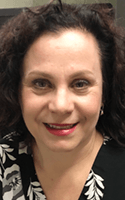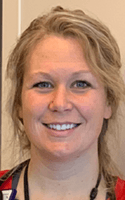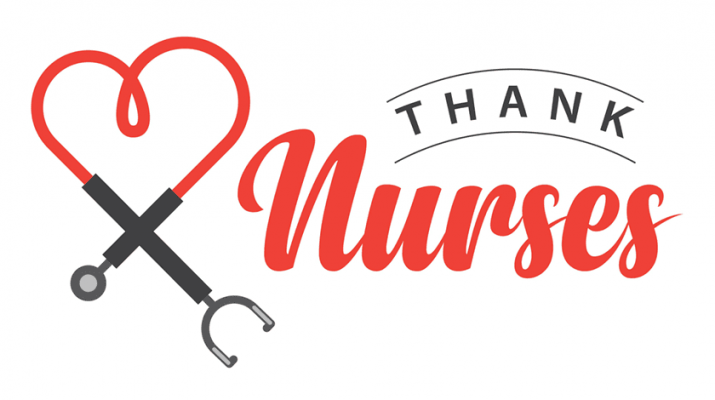By Deborah Jeanne Sergeant
For many children, their desired career changes on a whim. These two women always felt a strong pull towards nursing.

Donna Lynch
Upstate Family Medicine
Since girlhood, Lynch felt she wanted to become a nurse.
“I played nurse from when I was 3,” she recalled.
Right out of high school, she began attending St. Joseph’s School of Nursing and then obtained her Bachelor of Science in Nursing from Syracuse University. She worked at St. Joseph’s Hospital for about 18 months.
“I did a float pool to go to all the different departments to decide what I liked,” Lynch said.
She settled on coronary care, emergency, and intensive care. For the next decade, she worked in Crouse Hospital’s coronary care, and later the emergency room. But motherhood changed things for Lynch.
“Working 10- to 12-hour shifts was difficult,” she recalled.
She transitioned to outpatient services at Upstate Family Medicine in 2008 and has worked there ever since, eventually achieving her current position of clinical leader, the charge nurse of the clinic.
“I love the communication with patients and the interaction,” Lynch said. “I love talking with them all day.”
Though getting back with all her patients in a timely fashion challenges her some days, she enjoys helping them maintain good health.
She said that in her 22 years of nursing, the way nurses see their patients has changed the most.
“Now, everything is geared like a business, toward customer service,” Lynch said. “Everyone is looking at patients as a whole. We see our patients from birth until they pass away.”
Why patients come in is also shifting.
“Now, we are looking at more aspects of the entire family,” Lynch said. “Ten to 20 years ago, we didn’t have as many children with anxiety and depression. It’s more open now. We’re seeing a lot of that, not only in kids but in most of our patients. I think it’s being more recognized and talked about, even post-partum depression. There’s new medications to treat it. There’s more counselors now to help people. We have social workers and therapists to work with families and therapists.”
She advises anyone interested in nursing to volunteer at a hospital to see how nurses work with patients and doctors. Lynch also thinks it’s important to research nursing schools by attending nursing program open houses.
“Nursing is one of the best fields to go into because you can do anything: traveling nurse, in the home, for agencies. It’s not just hospital work,” Lynch said. “You’re not stuck in one place.”
Lynch and her late husband had one son, who is now a freshman in college. She enjoys working out, running, hiking, fishing and cooking.

Emery House
Upstate University Hospital
House always loved science and taking care of people. Those interests dovetailed in the field of nursing. She attended Cayuga Community College in Auburn and earned her bachelor’s degree and master’s from Keuka College so she could work in critical care.
“I like knowing more about my patients and having more autonomy in their care,” she said. “I can make a recognizable difference in people’s lives.”
She has worked at Upstate’s Downtown and Community campuses as a resource pool nurse. That means that a month in advance, she is assigned to whichever intensive care unit needs a nurse.
“I constantly get new learning experiences,” House said. “I love that. I love the variety and diversity. My particular role is to orient the nurses coming into this department through on-the-job training.”
One of her daily challenges includes facing ethical and social situations many find uncomfortable. It can relate to family dynamics and the family of patients making life-altering decisions for them if they cannot speak for themselves and have not appointed a health care proxy. Sometimes, the family does not agree with the health care proxy.
“We always try to do the best for the patient,” House said. “We carry out whatever wishes are identified by the patient or the health care proxy, but we have to set aside our own feelings so we can show we’re doing the best for what the patient wants.”
House never realized in nursing school the enormous responsibility of working as a nurse. She also didn’t anticipate the “many hats” nurses wear, such as conflict management, social work or housekeeping.
“We have good teamwork professionally with our patients and physicians and more,” House said, “but I wish more families were in touch with the greater good for the patient.”
She thinks that anyone with deep compassion, critical thinking skills and a willingness to learn can become a nurse. But it’s not easy.
“Nursing school is one of the hardest things I’ve ever done, but it doesn’t stop there,” House said. “Even going through a very challenging educational journey, once you’re in your work environment, you’re learning the extra things to do your job effectively.”
House likes to go out to lunch with other nurses on their days off, as well as spend time with her boyfriend and her dog.

